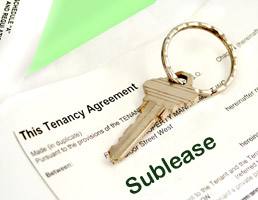 Prior posts on this blog have dealt with the legal issues regarding partition of property. To summarize, a partition action may be brought when a property has two or more owners, and the owners are unable to agree on the disposition of the property. One owner may wish to sell the property to a third party, and another owner may wish to retain the property.
Prior posts on this blog have dealt with the legal issues regarding partition of property. To summarize, a partition action may be brought when a property has two or more owners, and the owners are unable to agree on the disposition of the property. One owner may wish to sell the property to a third party, and another owner may wish to retain the property.
Often, one or more of the co-owners may live at the property in question. Another possibility is that none of the owners live at the property, and are renting the premises to a third party who is not a property owner. This blog post will explore the legal issues regarding tenants and occupancy of a property which may be subject to partition.
The first issue to be examined is where one or more of the owners lives at the property in question. Legally, any owner of the property is entitled to reside at the property if the property is residential in nature. For example, let’s assume a property owner passes away and leaves her house to her three children, each to own a one-third (1/3) share of the property. Under this scenario, any or all of the three children may reside at the house in question. None of the three new owners has a legal right to exclude the others from residing at the property. Of course, this can create problems in a scenario where one owner resides at the property, and the other owners do not. Since the non-resident owners do not have a legal right to evict the owner residing at the property, their main recourse would be a partition action to sell the property to a third party.





 In the New York metropolitan area, the residential real estate market is often seasonal. During the holidays between Thanksgiving and New Years Day, most sellers do not list their properties for sale or may remove their home from active listing status. During the winter months, most buyers are reluctant to be exposed to the cold weather and the snow to view properties. Fortunately, all of this changes with the approach of spring. The inventory of homes increases as more properties are listed and additional purchasers are looking to enter transactions. Both parties to transactions, who will experience increased competition as inventory increases, should take the steps described in this post so as not to miss the spring season.
In the New York metropolitan area, the residential real estate market is often seasonal. During the holidays between Thanksgiving and New Years Day, most sellers do not list their properties for sale or may remove their home from active listing status. During the winter months, most buyers are reluctant to be exposed to the cold weather and the snow to view properties. Fortunately, all of this changes with the approach of spring. The inventory of homes increases as more properties are listed and additional purchasers are looking to enter transactions. Both parties to transactions, who will experience increased competition as inventory increases, should take the steps described in this post so as not to miss the spring season. Many people who pass away also leave behind the place in which they resided. The housing could be a rental apartment, a cooperative or condominium unit, or a house. The deceased may not necessarily have resided in the property immediately before death if they went to assisted living or a nursing home. This blog post will address the legal and practical matters arising from housing of the deceased.
Many people who pass away also leave behind the place in which they resided. The housing could be a rental apartment, a cooperative or condominium unit, or a house. The deceased may not necessarily have resided in the property immediately before death if they went to assisted living or a nursing home. This blog post will address the legal and practical matters arising from housing of the deceased.
 Many parties to real estate transactions focus not only on the house or the
Many parties to real estate transactions focus not only on the house or the  Every person who dies, whether wealthy or not, will owe money. Whether there is a credit card balance outstanding or estate taxes due to the State of New York, most people will leave this world with a financial obligation of some type. The questions to be addressed in this blog post involve how the fiduciary of the estate should address such debts and whether the fiduciary is personally responsible for the debts. Also, should debts of the deceased be deducted from estate proceeds before distribution to beneficiaries?
Every person who dies, whether wealthy or not, will owe money. Whether there is a credit card balance outstanding or estate taxes due to the State of New York, most people will leave this world with a financial obligation of some type. The questions to be addressed in this blog post involve how the fiduciary of the estate should address such debts and whether the fiduciary is personally responsible for the debts. Also, should debts of the deceased be deducted from estate proceeds before distribution to beneficiaries? One of the most frequently asked questions when our firm meets with a new client relates to the awarding of attorney’s fees. Many of our landlord-tenant clients ask us whether they can recover their attorney’s fees in Court from the other party in the litigation. The answer to this question is not a simple one, and this blog post will answer under what circumstances a party may recover their attorney’s fees from the other party, whether in a landlord-tenant litigation, or other type of case.
One of the most frequently asked questions when our firm meets with a new client relates to the awarding of attorney’s fees. Many of our landlord-tenant clients ask us whether they can recover their attorney’s fees in Court from the other party in the litigation. The answer to this question is not a simple one, and this blog post will answer under what circumstances a party may recover their attorney’s fees from the other party, whether in a landlord-tenant litigation, or other type of case. 
 First, we would like to wish all followers of our blog a happy and healthy 2015. We look forward to continued successful legal outcomes for all of our clients in the New Year.
First, we would like to wish all followers of our blog a happy and healthy 2015. We look forward to continued successful legal outcomes for all of our clients in the New Year.